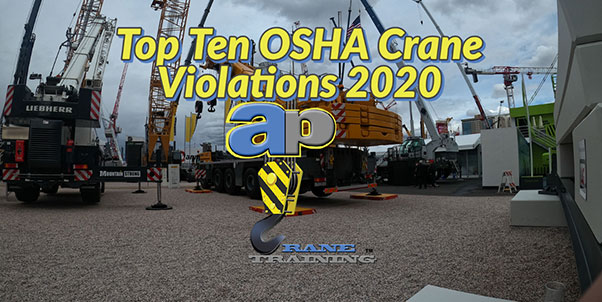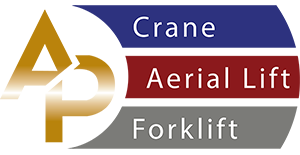
The top ten OSHA crane violations known to OSHA in 2020. To ensure top crane operators you must obtain a recognized accredited certification to properly avoid expensive OSHA fines. Also for the proper crane operator courses in the crane industry contact All Purpose Crane Training widely recognized nationwide throughout the United States.
Common Crane Violations
List of ten common crane violations in 2020:
- 1926.1412 Inspections
- 1926.1412 Signalperson Qualifications
- 1926.1408 Power Line Safety
- 1926.1425 Keeping Clear Of The Load
- 1926.1417 Operation
- 1926.1404 Assembly and Disassembly
- 1926.1427 Operator Qualification and Certification
- 1926.1431 Hoisting Personnel
- 1926.1413 Wire Rope Inspection
- 1926.1430 Training
Inspection Violations
OSHA reported on average 350 citations, more than 50 were considered dangerous. Employers must document crane inspections to ensure proof of inspections for OSHA standards and regulations.
1926.1428
Signalperson Qualification Violations
OSHA claims that signalpersons demonstrate qualification through written exams and practical exams, either by an accredited third-party qualified evaluator, like AP Crane Training. On average OSHA issued 170 citations and 65 percent of which were dangerous. Be mindful employers must be in compliance. Signal persons must know and possess basic hand signals. Be responsible with appropriate use of a hand, radio, or special signals. Signalperson certification exams follow OSHA's latest requirements.
1926.1408
Power Line Safety Violations
Power line safety remains to be an essential area of concern and risk. OSHA on average 150 violations and 85 percent of these were dangerous. Certified operators are expected to understand whereby to decide if either part of the equipment, load line, or load while crane operating limits. Operator certification exams address the safety requirements required by OSHA.
1926.1425
Keeping Clear Of The Load Violations
The most common sense of keeping clear of the load, on average about 140 citations are identified by OSHA and 85 percent were dangerous. Employees that are only essential to the lift service and qualified in the fall zone but never beneath a load. Certifications cover OSHA requirements securing that your personnel can avoid actions that could result in such a citation.
1926.1417
Crane Operation Violations
OSHA identified on average 125 citations when this specifically certification was developed to address operation violations. Of those, 66 percent were considered dangerous. Certification guarantees crane operators possess the knowledge to lift loads typically securely as possible. It is critical for crane operators to not engage in operating crane equipment when attention elsewhere or distracted, the most common use of a cell phone. Employers are responsible to guarantee that the procedures relevant to the operation of the equipment, including load capacity.
1926.1404
Assembly and Disassembly Violations
For Assembly and disassembly must be by a person who satisfies the standards for both a qualified person and a competent person, or by an acceptable person which is aided by one or more qualified workers. OSHA on average determined 82 percent out of 85 violations that were considered dangerous. This job continues to be assigned as a clear responsibility for the job site.
1926.1427
Operator Qualification and Certification Violations
OSHA expects employers to defend that each operator is properly trained, certified, and assessed in accordance with any equipment included under subpart CC. On average 85 citations are issued by OSHA discovering 73 percent of these were seriously dangerous. This category is the highest with citations. For certification to complete the requirements of 1926.1427, the crane operator school or organization must be a recognized accredited agency.
1926.1431
Hoisting Personnel Violations
OSHA on average identified 86 percent of the 75 violations related to hoisting personnel as dangerous. Hoisting personnel is an informative part within the areas of the certified operator exams. Certified crane operators know using crane equipment to lift workers is forbidden.
1926.1413
Wire Rope Inspection Violations
OSHA requires a qualified individual to inspect wire rope before or throughout a shift. OSHA found on average 70 citations, and 63 percent were dangerous. Certified operators are examined on the type of crane along with the type of material of wire rope and their utilization. Categorize any deficiencies found during their shift inspections and take the appropriate actions to notify the controlling entity before commencing work.
1926.1430
Training Violations
OSHA reported on average 86 percent of 60 citations were dangerous. Requirements must include teaching operators to be competent with operating the equipment that will be used for power line safety, signaling, emergency procedures, and more. A third-party provides accredited certification has been effective. Furthermore, the person being taught understands and use what was trained and is proper.
